Interviews 2000 (Part Two)
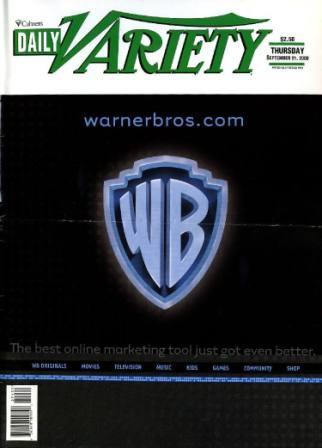

Daily Variety, 21 September 2000
Disney Pours A 'Bloody Mary' From Edwards' Miami 'Myths'
By Claude Brodesser and Charles Lyons, Daily Variety, 21 September 2000
[Re: Bloody Mary] "Fantasy works best when it's
working on a lot of levels, [when]
something has you really wondering, 'Is it real, or isn't it?'. These
homeless kids are living in a world that's on that borderline, because
they are living through the reality of social evils and abuse. What I
wanted to do was to use the conventions of urban myth to express our
anxieties about the real world.
"This is not going to be a Hellraiser or a Candyman; as a 48 year-old
man, I just don't make those kinds of pictures anymore. That sort of
in-your-face gore is a young man's game.
"We're not responding to the pressure coming out of Washington. This
is going to be suspenseful and scary, but it's an aesthetic decision
that it not be violent and gory..."
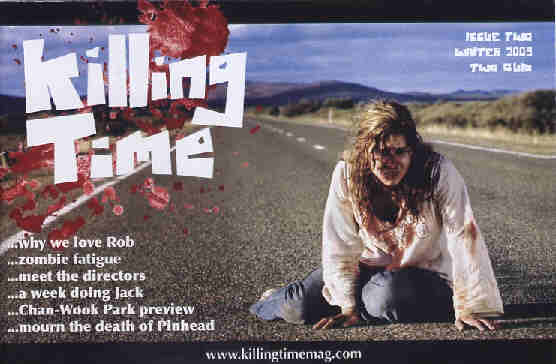
Confessions
By [Craig Fohr], (i) Lost Souls Newsletter, September / December 2000 (note - interview took place 25 August 2000) (ii) quoted in 'Pinhead... R.I.P' by [ ], Killing Time, Issue 2, Winter 2005
[Question from Revelations : Given the way that the animated characters
in Nelvana's proposed
version of Thief Of Always threatened to lose the (necessary) darker
edge of characters portrayed in that novel, what level of control have
you been promised over the visual development of characters in The
Abarat movie - or will a Disney style or mentality somehow now
influence the narrative that you write to accompany the oil paintings?]
"I know Phil and Sarah. It's a great question. And a very complicated
answer, so let's go for it piece by piece. I've always believed that a
different medium means a different creation. The Hellbound Heart and
Hellraiser are essentially the same story but they are completely
different experiences. Abarat on the page as illustrated by me in book
form will be completely different from the movie. Will it be the same
mythology? Yes. Will it have the same mixture of darkness and light, I
hope it will. But it's going to be a hundred million dollar movie as
opposed to a piece of writing and an oil painting.
"One of the things
that I feel is interesting about the venture which lies ahead with
Disney is that my approach to the imaginative and Disney's is, in many
ways, very different, but at certain points in my life I have been
very influenced by Disney. There are portions of Fantasia, if you go
back over my interviews over the last ten years you always find
Fantasia mentioned as my first or second favorite movie, with Pinochio
somewhere in there too. In other words Disney has produced movies
which have been hugely influential on me. Their visual styles, their
glamour, their imaginative density at their best is extraordinary.
Anybody who has seen Lion King on stage will testify to the fact that
now they have taken a new direction in the ways that they are dealing
with creators. Julie Taymor who directed that production had all kinds
of freedoms to create something I think is an extraordinary piece of
theatre.
"So what I'm hoping for is that it will be a marriage of the best of
Barker and the best of Disney. That's what I hope. Do I think we will
both have to both make compromises? Sure. But what I am looking for is
a kind of marriage in a way of creative minds. Some of the people that
I've met at Disney since we've started have been extraordinary, I mean
just in terms of their imaginative grasp and the way they understood
what I've been putting into my oil paintings and their enthusiasm for
my world and my worlds and their knowledge of my worlds.
"Now when I created the Abarat I always said I wanted this a kind of
place where everybody could play. I would write books and make
paintings, but other people would come along and make comic books, and
other people would come along and make movies and TV shows, and so on.
I would be involved in those things, but I can't be involved in
everything. My first duty is to the things that I can make my
strongest personal mark upon. And that is the books and the paintings.
And that's what I will continue to do. So I'm putting a lot of faith
in Disney. And I'm looking forward to the creative process with them
immensely.
"I miss collaboration. I enjoy collaboration immensely. It's
one of the great things about the best parts of my life are those
parts in which in a given day I can do something collaborative, maybe
work on the maze for instance, but then also have some time in my
studio painting and some time in my writing space writing. Those are
my best days. Days when I get to do something very personal and inward
looking at some point. But there are other points to get to. You know -
dance with other people, as it were, and share their ideas and their
enthusiasm. There is something very enriching about having an exchange
like that. So that's my hope that we will end up with a marriage of
minds."
Clive Barker : A Renaissance Man Of Gothic Proportions
By Gil Kaan, Genre, Issue No 86, October 2000
[Re Universal's Clive Barker's Harvest] "This year it's 'Harvest', last
year it was 'Hell', the year before that is was 'Freakz'. It goes back
to an appetite I have for circus and freak shows. The great thing is
that Universal mounts these attractions almost like little pieces of
theater, with a cast of 35 and a set in which this cast moves through
constantly. They've all got their own rules and lines and characters.
We move about 7,000 people through that space every night. So it's a
large endeavor, but it's very tactile, very... nonintellectual.
Very nonintellectual. It's all about getting goosed in the dark!
It's all about going in there and having someone scare the bejesus out
of you! It's tremendous fun.
"My husband David and I designed these
things together. David loves this as much as I do. He really helps me
make them, polish them, and is really good at adding the little details
which turns a good scene into a great scene. And then we have the great
thrill of standing back from the studio - they actually put these
movies in the studio. And you just hear people screaming. It's great!
They come out with shit-eating grins on their faces, because there is
something completely primal about going into a dark space. You've been
in line for an hour or two (last year the line got as long as three
hours), and the expectation grows, because all you can hear from ahead
is people yelling, laughing, screeching. You're getting closer and
closer, and, now, the screaming is getting really loud and you're
thinking, 'What the fuck are they doing to people in there?' You see
the people come out giggling and joining the line again. And then, you
get in! And it smells of smoke and special effects and paint and a
little sweat, because people are a little clammy.
"It's just a fun time and then you're really on your own. I mean it's
not one of those experiences where you are led by the hand. You move
through the space at your own pace. Things are going to hang down on
top of you and grab you and whisper obscenities in your ear. You know
it will be a fun time had by all."
Theme Parks Are A Scream
By Laurie K. Schenden, Los Angeles Times, 5 October 2000
"[Harvest will] really push the disgust button, with things oozing down
the walls and running around your feet. [It is my duty as a maze
designer to] commit to the most troubling,
disturbing experience you can give.
"I watch all these people going in, smiling and laughing, then you hear
them screaming their heads off. Then they come out again laughing."
Oh, The Horror, The Horror!
By Dan Bennett, The Orange County Register, 6 October 2000
"Halloween is not traditionally part of the British culture. We have an early winter festival incorporating some of the same elements. Halloween is picking up there, but Americans have a much healthier and long-lasting tradition. Halloween is more than a time to cut holes in pumpkins. It's a chance to play around a little with the more frightening aspects of your alter ego... it's therapueutic."
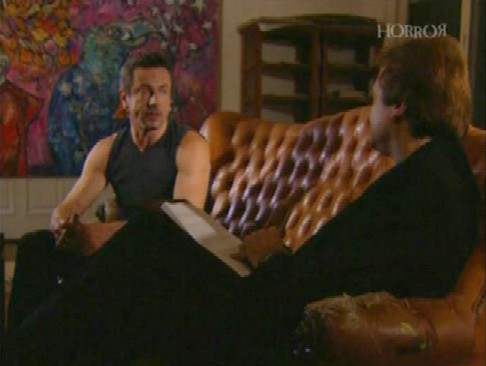
Dark Dreamers
By Stanley Wiater, CH-TV, Canada, Fall 2000 (note - interview took place 6 October 2000)
"I don't have a career, I think: the word 'career' doesn't really connect to me, I don't know; a career implies some grand ambition. Career actually implies fiscal ambition, more than anything else, I think, which has never been a major part of my planning. I don't think of myself as having a career, I think of myself as having a life in the imagination; living in the imagination... I'm not anticipating death will stop me; I fully anticipate continuing to make movies after death - I'm joking!"
A Hard Night's Haunt
By Philip Zonkel, Press-Telegram Weekend, Los Angeles, 13 October 2000
"I have extremely vivid dreams. I don't know where any of this stuff comes from. I tend not to analyse it too closely. I don't want to be
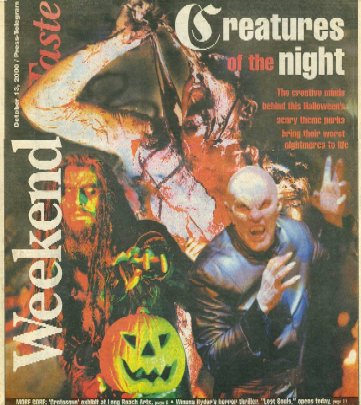 too self-conscious. I don't think it's too healthy to be figuring it out as you go along. Part of the point is to be giving all that you can emotionally and creatively and letting things speak for themselves...
too self-conscious. I don't think it's too healthy to be figuring it out as you go along. Part of the point is to be giving all that you can emotionally and creatively and letting things speak for themselves...
"I wouldn't want a bunch of six-year-olds going around the maze at Universal. We're putting some strong images in there. I want it to be strong, visceral entertainment. It's not meant for kids... We're attempting to goose people. You always want to make it a little more intense than what people think they're going to get. That's part of the fun of it. There's only so many times you can turn the lights out. What we try to do is provide images that make people recoil.... There's a point where you start to fling ketchup around and the audience just turns off. We're emphasising the creepiness, the stuff you don't expect to find when you turn the corner, and the imaginative over the bloody. You want to make sure that there's never a moment in the experience when the guest really has time to rest... People pay money to come in and be scared, and I want to scare them."
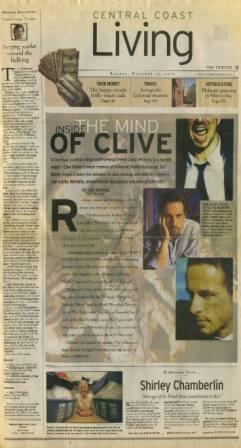
Inside The Mind Of Clive
By Joe Brekke, The Tribune, San Luis Obispo, California, 15 October 2000
"I've been making plays and paintings and films and writing stories for twenty-five years. One of the things I love about making fantasy and horror is the
chance to be protean, to have many faces. If I've got another twenty-five years, I'd like to be as unrecognisable to myself and to readers as I am,
looking back, over the last twenty-five years...
"I want people to pick up a book believing that the imaginative journey they took with me wasn't just entertainment. Hopefully it gave them something, an
opportunity to look at life in a way they haven't looked at it before. I think that's how our lives are changed - by increments."
Dreaming Of A Nightmare
By James Bohling, Frontiers, 27 October 2000
"I am sitting in front of Coldheart Canyon, the Hollywood novel which I am proofreading. It's my Hollywood gothic novel.
"It's a book about the dark side of Hollywood. It feels a little bit like a roller coaster ride here in my office just to get it to delivery - the final 'kick bollock and scramble' before it's given over to the press. It's a big book... it's got a lot of stuff 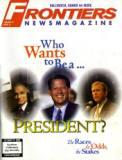 about Hollywood that I've wanted to put on paper for a long time.
about Hollywood that I've wanted to put on paper for a long time.
"I hope every book is, in some measure, a surprise. When I did The Thief of Always, which is a kids' book, that was a surprise. When I did Sacrament, which was a gay book, that was a surprise. When I did Galilee, which had a black hero, that was a surprise. People know I live in Hollywood, so perhaps it won't be a surprise that I've chosen to devote one of my novels to that subject, but I think my take on it may surprise people a little bit. I hope it does. I've tried to find a bitter-sweet point of view rather than simply being vitriolic, which is too easy. There are many things about Hollywood I love, and I want to make sure the book expresses my love-hate relationship."
Horror In Books And Movies: Clive Barker
By [ ], USA Today Online Chat, The Nation Talks : Live, 31 October 2000 (Note - full text at usatoday.com)
"Imajica is my favorite amongst my books. I don't think there will be a sequel, simply because I feel as though thematically the narrative was satisfying and complete in itself. That is not to say that I might not wake one morning having dreamt a sequel into being. Imajica was a book which was fueled by literally dozens of dreams, which informed the direction of the narrative and the nature of the imagery.
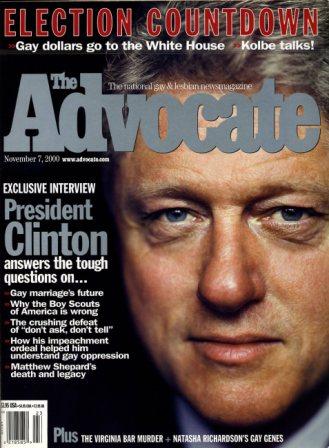

The Advocate, 7 November 2000
Barker's Bloody Good Fun
By [ ], The Advocate, 7 November 2000
[Re: Halloween] "Is it the biggest gay holiday of the year? I'm sure there are straight men up and down the country who just can't wait for the holiday so that they can play out some fantasy or other. You get a lot of S/M fantasy coming out at Halloween. It's a time when you borrow the neighbour's whip."
To Hell And Back
By Gina McIntyre,
Wicked, Issue No 4, Fall 2000
"Putting aside the fact that I'm obsessively dissatisfied with what I do, I think [Hellraiser] works and it has a great seriousness of intent. It was put out at a time when horror movies were beginning to get tongue-in-cheek, and that process has only increased since the movie was made. It was swimming against the tide when it came out, and it's still swimming against the tide. I don't know whether you'd get a theatrical release for a picture like that now. It would be interesting if nobody had ever heard of it before and you took Hellraiser, a $900,000 movie, to Dimension or New Line today. Would they put it out on 2,000 screens? I think the odds are against it."
Raising Hell With Clive Barker
By Raymond M. Padilla, Happy Puppy.com, December 2000 (Note - full text at happypuppy.com)
"I've become increasingly aware that [gaming] is the world of the future. It's one of the places people will find stories. Working on games is a dream come true; potentially, every time you play a game, it's a different experience... I just finished a book, and several times in the narrative I thought about games. There are points where characters have to make decisions, but in gaming there are several different possibilities. In games, I can have one tree and give it several different branches that are all fruitful."
Clive Barker : Part One
By Smilin' Jack Ruby, Fandom.com, 13 December 2000 (Note - full text at fandom.com)
"I'd written Galilee, had just started work on the new book, but was
also making notes upon Galilee 2 which is another big family saga. I
love family sagas. Family sagas are the drama of our lives. They are
the dramas we all live. Christmas is upon us. We are all about to walk
into our own families and everybody can relate to it. The sister, the
brother, you know? I just voiced Ambrose, the black sheep of the family,
feeling totally, appropriately that I should be voicing this character
- having a blast doing it, but unfortunately it's ruining my voice and
I sound like Carol Channing.
"The great thing was being another part of the process. I love working
with these people. They've been completely good to me. They have taken
me through my infancy in this creative process. I knew nothing about
games. I know a lot more now and in a way, my naiveté was useful in a
way in the beginning. The interesting thing is, I think the game works
better than I think any of us thought it would because it's attempting
a lot of things. It's attempting to be moment-to-moment exciting, it's
attempting to have a puzzle element to it, which you only have seen a
tiny piece of in what Brady was showing you this morning. It has visual spectacle, no question and it has real,
genuine characters. I mean, in the sense that each of the individuals
acts differently. What is a character? A character is someone who acts
with certain behavior patterns which are unique to him or her, yes?
Only X will act this way, only Macbeth will act this way under these
circumstances. That's what makes him Macbeth. We tried really hard to
make sure that happens in this game. The people are responding in ways
that make sense to their characters. "
Clive Barker : Part Two
By Smilin' Jack Ruby, Fandom.com, 13 December 2000 (Note - full text at fandom.com)
"That [the next publication for Gauntlet Press] would be poetry. It's poetry I've been writing for a long time. I write a lot, but I kept most of it under wraps. I like the guys at Gauntlet a lot. I've done a couple of covers for them. I did the cover for Mick Garris' recent book and I just think that they come at it with the right attitude which is to do things that are a little off the beaten track."
Clive Barker's Undying
By Vincent Lopez, Ign.com, 13 December 2000 (Note - full text at ign.com)
"[My involvement with Undying was about] tactfully, and without offending anybody, drawing out what I thought were the strengths."
Clive Barker
By Paul Semel, Gamespy.com, [13] December 2000 (Note - full text at gamespy.com)
"In a way, [Undying] does go back a bit to the Books Of Blood, the feelings
I had when I wrote those books, which was that there were no rules.
There are some things in this game that are just outrageous. Ambrose,
particularly in his transformed state, is really just disgusting. I
also think, if you look at this game, it's designed like a movie, it
feels like a movie. It's not brightly colored like a Pokemon game, it
has sepias and grays and occasionally eruptions of red.
"I think, in a way, you can tie Undying to Edgar Allan Poe or H.P.
Lovecraft. Some of the landscapes definitely bring to mind some of the
weird, inter-dimensional spaces that Lovecraft evoked, while once you
get inside the house, and you see all the twisted, messed-up family,
you're in Poe territory, the same territory that informs The House Of
Usher. So I think we paid our dues to our literary forebears, and then
moved on into something wilder."
Clive Barker Talks About Undying
By Tom Chick, Gamecenter.com, 14 December 2000 (Note - full text at gamecenter.com)
"We need to get to a place [in computer games] where somebody takes a breath and sheds a tear. You know?... You can say Dickens is sentimental. Sure. Orphans, dogs. Absolutely. Nothing wrong with that. I would like to see more orphans and dogs in games. I would like to see more going for the heartstrings. I would like to see more going for genuine horror. I don't mean the casual horror of monsters with a lot of teeth. I mean stuff that induces a kind of dread in you. Before the next five years are out, I will create The Exorcist for this darn thing if it kills me. I'll create something where you have to turn it off because it's just too fucking much."
A Look Inside Clive Barker's Undying
By Scott B., IGN.com, 15 December 2000 (Note - full text at filmforce.ign.com)
"The whole process of making stories can stir you so deeply that you
weep, and you feel better for weeping. If there's something wrong with
the medium that we are all presently working in [at Electronic Arts],
it is that it doesn't yet do that. At all. It doesn't have an
emotional life. We need to be courageous about our emotional lives in
this business. I want to try it. I might be the only one who does, but
I want to try it.
"If this craft is going to become an art, then it needs to stand up
and be available to emotional accounting. [My involvement in 'Undying'
came too late to] make it the big emotional work I wanted it to be.
Too much of it was already in place. You'd have to deconstruct it so
much... it wasn't that style of game."





